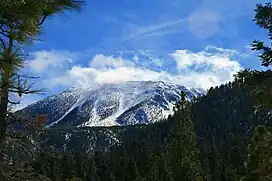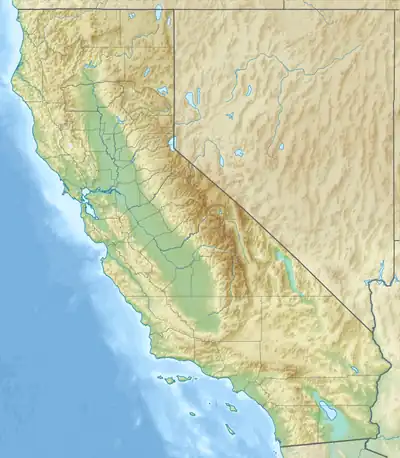| San Gorgonio Mountain | |
|---|---|
 | |
| Highest point | |
| Elevation | 11,503 ft (3,506 m) NAVD 88[1] |
| Prominence | 8,294 ft (2,528 m) ↓ Soledad Pass[1] |
| Isolation | 162.49 mi (261.50 km) → Charleston Peak |
| Listing | |
| Coordinates | 34°05′57″N 116°49′29″W / 34.099162°N 116.824853°W[1] |
| Naming | |
| English translation | Saint Gorgonius |
| Language of name | Spanish |
| Geography | |
 San Gorgonio Mountain | |
| Location | San Bernardino County, California, U.S. |
| Parent range | San Bernardino Mountains |
| Topo map | USGS San Gorgonio Mountain |
| Climbing | |
| First ascent | 1872 by W. A. Goodyear and Mark Thomas |
| Easiest route | Strenuous hike |
San Gorgonio Mountain, also known locally as Mount San Gorgonio, or Old Greyback, is the highest peak in Southern California and the Transverse Ranges at 11,503 feet (3,506 m).
It is in the San Bernardino Mountains, 27 miles (43 km) east of the city of San Bernardino and 12 miles (19 km) north-northeast of San Gorgonio Pass. It lies within the San Gorgonio Wilderness, part of the Sand to Snow National Monument managed by the San Bernardino National Forest.
Spanish missionaries in the area during the early 17th century named the peak after Saint Gorgonius.
Since it is the highest point in a region which is separated from higher peaks (e.g. in the Sierra Nevada) by relatively low terrain, San Gorgonio Mountain is one of the most topographically prominent peaks in the United States. It is ranked 7th among peaks in the 48 contiguous states[2] and 18th overall.[3]
Like other high peaks in the Transverse Ranges, the mountain has a pyramid shape, with a steep north face and a slightly shallower south face. The mountain is large and broad; the summit plateau itself is one square-mile in area (2.6 km2).
In contrast to its spectacular but lower neighbor, San Jacinto Peak, San Gorgonio is not particularly craggy, and from a distance, it appears to be an extremely high hill, earning it the name of greyback. Despite not being particularly striking in appearance during the summer, it is the only mountain in Southern California with a summit a significant distance above the tree line. As such its bright white winter snow cap, unobstructed by vegetation, makes the mountain noticeable from many miles away. The mountain hosts the longest recorded line of sight in the contiguous United States; it is plainly visible from the summit of Mount Whitney, 190 miles (306 km) away.[4]
Geography


San Gorgonio Mountain lies at the easternmost extremity of the Transverse Ranges. The mountain is a heavily eroded, partially dissected plateau.[5]
Big Bear Lake, California is the largest city near San Gorgonio, and hosts two major ski resorts; it is also used for summer recreation.
Geology
The shape of the mountain is influenced by a series of steeply dipping thrust faults on the north face of the mountain. The south side of the mountain contains river canyons typical of a dissected plateau.[5]
The mountain consists of a massive block of quartz monzonite, which sits on an ancient platform of Precambrian gneissic rocks. Glacial and fluvial deposits dominate the surface of the lowest part of the mountain.[6]
Hydrology
Three major Southern California rivers have their source on San Gorgonio Mountain: the Santa Ana River, the Whitewater River, and the San Gorgonio River.
Jenks Lake, on the north slope of the mountain, is one of the few perennial lakes in Southern California.
San Gorgonio Mountain sits on the Great Basin Divide, which separates streams that flow into the basins of the Basin and Range Province from rivers that flow into the Pacific Ocean.
Climate
The climate on most of the mountain is Csb (Warm-summer Mediterranean) under the Köppen climate classification. The summit of San Gorgonio has a dry summer subalpine climate (Köppen Dfc), bordering on Alpine climate (ET), with only two months averaging over 10°C.
| Climate data for San Gorgonio Mountain 34.1009 N, 116.8240 W, Elevation: 11,132 ft (3,393 m) (1991–2020 normals) | |||||||||||||
|---|---|---|---|---|---|---|---|---|---|---|---|---|---|
| Month | Jan | Feb | Mar | Apr | May | Jun | Jul | Aug | Sep | Oct | Nov | Dec | Year |
| Mean daily maximum °F (°C) | 36.5 (2.5) |
35.6 (2.0) |
38.7 (3.7) |
42.7 (5.9) |
50.5 (10.3) |
60.5 (15.8) |
65.5 (18.6) |
64.6 (18.1) |
59.9 (15.5) |
51.5 (10.8) |
43.0 (6.1) |
36.9 (2.7) |
48.8 (9.3) |
| Daily mean °F (°C) | 26.8 (−2.9) |
25.5 (−3.6) |
27.9 (−2.3) |
31.7 (−0.2) |
37.3 (2.9) |
46.3 (7.9) |
51.5 (10.8) |
50.8 (10.4) |
48.0 (8.9) |
40.3 (4.6) |
33.0 (0.6) |
27.0 (−2.8) |
37.2 (2.9) |
| Mean daily minimum °F (°C) | 17.1 (−8.3) |
15.3 (−9.3) |
17.2 (−8.2) |
20.7 (−6.3) |
24.2 (−4.3) |
32.1 (0.1) |
37.5 (3.1) |
37.0 (2.8) |
36.2 (2.3) |
29.1 (−1.6) |
23.0 (−5.0) |
17.2 (−8.2) |
25.6 (−3.6) |
| Average precipitation inches (mm) | 11.93 (303) |
11.64 (296) |
7.81 (198) |
3.49 (89) |
1.06 (27) |
0.23 (5.8) |
0.43 (11) |
0.49 (12) |
1.54 (39) |
3.72 (94) |
4.13 (105) |
7.08 (180) |
53.55 (1,359.8) |
| Source: PRISM Climate Group[7] | |||||||||||||
Hiking
Like most other peaks in the Transverse Ranges, the summit is a technically easy "class 1" hike. Several trails lead to the broad summit of San Gorgonio Mountain, which rises a few hundred feet (100 m) above the tree line. Most routes are very strenuous and require well over 4,000 feet (1,200 m) of elevation gain.
The trail leading from the Fish Creek Trailhead to San Gorgonio Mountain has about 3,400 feet (1,000 m) of gain, less than the routes from the South Fork and Vivian Creek trailheads. Some junctions on this trail are not well marked.
Aircraft wreckage
On December 1, 1952, a Douglas C-47, serial number 45-1124, crashed at the 11,000 feet (3,400 m) level on the eastern face of the mountain. The C-47 was en route from Offutt Air Force Base, Nebraska to March Air Force Base near Riverside, California when it struck the mountain at night in the middle of a storm. "The aircraft was last heard from at 9:51 p.m. Pacific Standard Time, Monday." Thirteen people died.[8][9]
Nearly one month after the C-47 accident a Marine Corps HRS-2 helicopter, bureau number 129037, crashed on the mountain in coordination of the efforts of recovering the victims.[10] The three crewmen of the helicopter survived the impact.[11] The remains of the wreckage of the two aircraft were left on the mountain and are accessible via the Fish Creek Trailhead or the South Fork Trailhead.
In more recent years, the mountain claimed the lives of Frank Sinatra's mother, Dolly[12] (January 6, 1977) and Dean Paul Martin (March 21, 1987), son of Dean Martin, in unrelated plane crashes. Martin was an Air National Guard pilot; the McDonnell Douglas F-4C he was flying disappeared in a snowstorm and the wreckage was found on the mountain several days later.[13]
See also
References
- 1 2 3 "San Gorgonio Mountain, California". Peakbagger.com. Retrieved 2008-11-22.
- ↑ "USA Lower 48 Top 100 Peaks by Prominence". Peakbagger.com. Retrieved 2012-04-01.
- ↑ "USA Peaks with 6000 feet of Prominence". Peakbagger.com. Retrieved 2012-04-01.
- ↑ Longest lines of sight
- 1 2 J.C. Matti and D.M. Morton, U.S. Geological Survey, Geologic setting, San Bernardino National Forest
- ↑ Dibblee, T.W., 1964, Geologic map of the San Gorgonio Mountain quadrangle, San Bernardino and Riverside Counties, California: U.S. Geological Survey, Miscellaneous Geologic Investigations, Map I-431, scale 1:62,500.
- ↑ "PRISM Climate Group, Oregon State University". PRISM Climate Group, Oregon State University. Retrieved October 2, 2023.
To find the table data on the PRISM website, start by clicking Coordinates (under Location); copy Latitude and Longitude figures from top of table; click Zoom to location; click Precipitation, Minimum temp, Mean temp, Maximum temp; click 30-year normals, 1991-2020; click 800m; click Retrieve Time Series button.
- ↑ "Transport Plane Wreckage Hunted", Playground Daily News, Fort Walton, Florida, 4 December 1952, Volume 7, Number 44, page 2.
- ↑ G. Pat Macha (2013). Historic Aircraft Wrecks of San Bernardino County. The History Press. pp. 72–75. ISBN 978-1-62619-012-2.
- ↑ "The San Gorgonio C-47 9/5/05". SmugMug. Joe Idoni. 5 September 2005. Retrieved 18 October 2014.
"Private-Law 88-159" (PDF). Statute-77. Government Printing Office. 30 December 1963. Retrieved 18 October 2014.
G. Pat Macha (2013). Historic Aircraft Wrecks of San Bernardino County. The History Press. p. 73. ISBN 978-1-62619-012-2. - ↑ "C47 Transport Crashes on Mount San Gorgonio". Qnet.com. Retrieved 2008-11-24.
- ↑ Bill Bell; Michelle Caruso; Ana Figueroa; Corky Siemaszko (May 18, 1998). "Facing Life Without Him Sinatra's Wife Seeks Solace". NY Daily News. Retrieved July 28, 2012.
- ↑ Chicago Sun-Times (March 26, 1987). "Dean Martin's son's jet found wrecked". Chicago Sun-Times. Archived from the original on April 15, 2016. Retrieved July 28, 2012.(subscription required)
External links
- "San Gorgonio". SummitPost.org.
- "San Gorgonio Wilderness Association".
- OnTheTrail.org - San Gorgonio Topo and Trail Map
